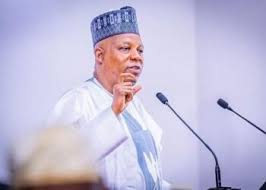At the heart of Nigeria’s capital on a quiet Monday morning, something urgent was stirring. Not the usual political drama or fuel subsidy saga—but trees. Yes, trees. Or rather, the shocking realisation that Nigeria is fast running out of them.
At the Nigeria Forest Economy Summit 2025, held at the State House in Abuja, Vice President Kashim Shettima didn’t mince words. “More than 90 percent of Nigeria’s original forest cover is gone,” he warned. “And we’re losing over 400,000 hectares every year.” Pause. Let that sink in. It’s like clearing out 400,000 football fields annually—minus the noise and jerseys.
Represented by Senator Ibrahim Hadejia, Shettima declared the situation “not just an environmental crisis, but an economic emergency.” Now, in a country where people are used to alarms over naira devaluation and food prices, this green alarm might not cause immediate panic—but it should.
Forests: Nigeria’s Forgotten Fortune
Nigeria’s forests, according to Shettima, aren’t just pretty scenery or shade for village goats—they’re an untapped goldmine. They hold timber, medicinal plants, fruits, and enormous biodiversity. They support agriculture, trade, health, and even finance. “Yet this vast potential remains largely ignored,” he lamented.
Across the world, countries are cashing out from their forests. Vietnam makes over $15 billion annually just from forest exports. Ethiopia has created 350,000 jobs by replanting trees and building value chains. Even Brazil’s Amazon contributes a whopping 15 percent of their GDP.
Meanwhile, in Nigeria? We’re cutting trees faster than we plant them—often for firewood, farming, or illegal logging. “We must act now or risk falling behind in global trade,” Shettima added, noting that the European Union is already banning products linked to deforestation.
If Nigeria doesn’t clean up its forest act soon, we may be banned from exporting to important markets. And that could hurt everything from cocoa to cashew and even palm oil—some of our national pride.
Turning Trees Into Trillions?
The summit wasn’t all gloom. It was also about hope—and money. Lots of it. The big idea? That Nigeria’s forests could generate over $2 billion every year, if properly managed. Some say even up to $10 billion, if we play our cards (or branches) right.
Dr. Sadiq Sani, CEO of Netzence Sustainability Limited, brought some futuristic firewood to the table. His company is using tech—yes, tech—to track emissions, measure carbon credits, and help Nigeria cash in on climate solutions. “We’re building models to show how much carbon our forests store, and how to monetise that,” he explained.
It’s called carbon financing—basically, companies around the world pay countries to protect forests instead of destroying them. It’s like being paid not to eat your last piece of puff-puff.
And Netzence isn’t working alone. Dr. Sani confirmed active partnerships with ministries like Environment and Livestock Development. The goal? To make Nigeria’s forests pay, not just in oxygen, but in dollars.
From Bamboo to Shea Butter: A Forest Future
The vision goes beyond just saving trees. Shettima painted a vivid picture of eco-industrial parks—places where forest resources like bamboo, shea butter, and medicinal plants can be processed into valuable goods.
And there’s a human angle too. Around 30 million Nigerians—mostly women and girls—are financially excluded. “Embedding financial services in forest-based livelihoods will improve credit access, savings, and insurance,” he noted. In simple terms: trees can lift people out of poverty.
Nurudeen Zauro, Technical Adviser to the President and Secretary of the Committee on Economic and Financial Inclusion (PRICIFI), added that the plan is part of President Tinubu’s larger inclusive economy agenda. “We are here to unlock silent opportunities,” he said. “Our forests are one of them.”
Danny Sokari, of Wen Synergies, put it more bluntly: “People don’t know that this $2 billion is even possible. That’s why we organised this summit—to wake everyone up.”
Can We Stop the Green Leak?
It’s a serious question. Nigeria has 10.6 million hectares of forests left. That sounds like a lot, but at the current rate of deforestation, it might not be for long.
George Kelly, head of the Border Communities Development Agency, said if managed well, forests could bring in billions. “We’re talking $5 to $10 billion annually. That can fund entire states.”
But managing forests isn’t just about planting trees and hugging them. It needs data, laws, local action, and community buy-in. It also means tackling illegal logging, empowering rural dwellers, and investing in green industries.
Vice President Shettima closed with a rallying call: “Let us turn trees into trillions and forests into futures.” Grand words, but they come with a challenge: can Nigeria shift from destroying nature to building wealth from it?
Because one thing’s for sure: when the last tree falls, there won’t be WiFi. And you can’t cook jollof rice with promises.
Tagline: If we don’t protect our forests, na we go suffer pass. The trees may be silent—but their disappearance is screaming.





